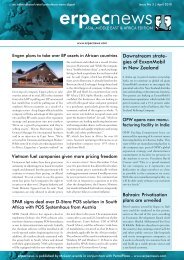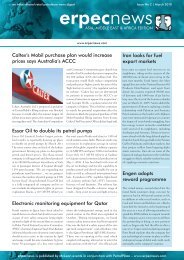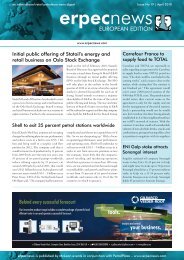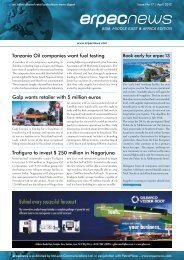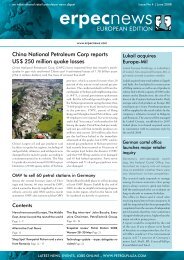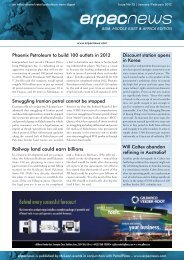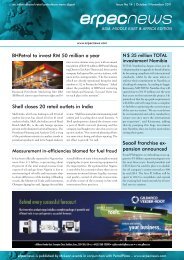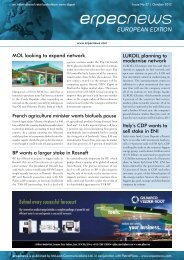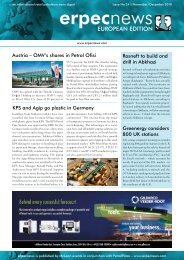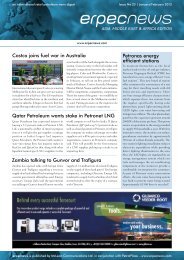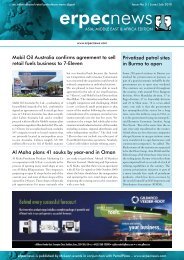You also want an ePaper? Increase the reach of your titles
YUMPU automatically turns print PDFs into web optimized ePapers that Google loves.
XXX NewS<br />
22<br />
ALTERNATIVEFUEL NEws<br />
Honda does not, believe in pure electric cars<br />
The parent company of the first electric car<br />
launched on the market in 1997, the Honda<br />
EV Plus (in production for only two years), is<br />
now skeptical on the success of this kind of<br />
car. The head of Honda’s research, Tomohiko<br />
Kawanabe, said: “we need to see if consumers<br />
are willing to accept limited autonomy of electric<br />
cars and the ‘hassle’ of long time reload”, then<br />
added, “we are continuing research into electric<br />
cars, but at present I would not advise”. The<br />
skepticism of Honda is in contrast with predictions<br />
of another major Japanese manufacturer,<br />
Nissan, previewing by 2020 a market share<br />
of 10 percent for electric cars. The problem<br />
is that cars like the Mitsubishi i-Leaf or Miev<br />
have limited autonomy, about 150 – 160 km,<br />
influenced by the use of onboard services, such<br />
europe’s first commercial fast-charging ev station opens<br />
Europe’s first commercial smart-charging station<br />
for electric vehicles (EV) has opened for<br />
business in The Netherlands. Developed by<br />
smart-charging solutions leader, Epyon Power,<br />
and operated by Dutch utility company, Essent,<br />
the charging stations are fully operational and<br />
accessible at the Tamoil petrol station in Leeuwarden,<br />
the capital city of Friesland province.<br />
The motivation for the charging stations is<br />
obvious: to stimulate Electric Vehicle use, to<br />
show how quick the smart-charging stations<br />
can be installed, and to show that they can also<br />
function safely in the controlled environments<br />
of petrol stations. The fast-charging station<br />
delivers 50 kilowatts of power and can fully<br />
Mascoma lands deal with Chevron<br />
Mascoma, which wants to develop microbes<br />
that can convert woody biomass into ethanol,<br />
has signed a important deal with Chevron<br />
Technology Ventures. Under the deal, Chevron<br />
will supply feedstocks to Mascoma, and then<br />
Mascoma’s microbes will convert the material<br />
into ethanol and lignin, the tough material<br />
that protects plants. Chevron will then evaluate<br />
the result. To survive and thrive, biofuel<br />
startups will invariably have to partner with<br />
as air conditioning, or the route: it consumes<br />
more in the long distances with the accelerator<br />
fully depressed. Indeed, not all think like<br />
Nissan: Menahem Anderman, president of a<br />
consulting firm for the alternative energy segment<br />
called Advanced Automotive Batteries,<br />
believes that by 2020 not more than 1 percent<br />
of cars in the world will mount an electric<br />
motor. Honda has a vision made reality by the<br />
electric car prototype FCX Clarity, driven by an<br />
electric motor, but powered by a hydrogen fuel<br />
cell which produces the power required by the<br />
electric motor. Who is right? – In fact no one<br />
in the sense that there is, today, a “definitive”<br />
solution. The current battery technology is<br />
limited and expects a generation jump (which<br />
will not happen soon) to see “batteries” with<br />
a significantly increased capacity of storing<br />
energy. So probably, within the next 10 years<br />
we will mainly see electric city cars. For longer<br />
journeys there will be hybrid cars in their various<br />
technological designs. The electric-powered<br />
Honda FCX Clarity hydrogen should have a<br />
more limited market, because of the lack of a<br />
network of hydrogen filling stations.<br />
charge the 9-person taxi-vans of Taxi Kijlstra in<br />
only 30 minutes. The stations are also remotely<br />
monitored and controlled through Epyon’s<br />
Power-Routing Network. A single fast charging<br />
station can operate several compact outlets so<br />
multiple EV’s can be charged simultaneously<br />
from a single charging station. Taxi Kijlstra,<br />
the largest taxi firm in the north of the Netherlands,<br />
recently transformed two of their taxi<br />
fleet into electric powered vehicles without any<br />
limitations on the service side. The taxi-vans<br />
can drive 100 kilometre or more on a single<br />
fast charge. Friesland has an ambitious target<br />
of having 100 000 EV’s on the road within the<br />
next five years.<br />
the major fuel companies. Chevron already<br />
has an R&D alliance with Solazyme, which<br />
makes algal biodiesel. Shell has deals with<br />
70 or so different alternative fuel companies,<br />
according to sources. Mascoma recently underwent<br />
some management changes. CEO<br />
Bruce Jamerson became chairman and also<br />
chairman of Frontier Renewable Resources,<br />
which is trying to raise money to build a plant<br />
in Michigan based around Mascoma’s microbes.<br />
LateSt aLterNatIve FueL NewS – www.PetroLPLaza.CoM<br />
ohio chooses local<br />
business to expand its<br />
fuel solutions<br />
A family business in the US, which turned<br />
to compressed natural gas to fight rising fuel<br />
costs for its fleet, has been chosen by the state<br />
to spread the solution to other parts of the<br />
Ohio. Kirk Energy Group LLC has received<br />
more than US $ 2.7 million in federal stimulus<br />
grants through Clean Fuels Ohio to build four<br />
compressed natural gas fuelling stations in<br />
the state. “Our [customer] demographic is<br />
not Joe and Mary Smith; our demographic<br />
is the fleets in the market we operate”, said<br />
Christian Pedersen, co-managing member of<br />
Kirk Energy, along with his brother-in-law,<br />
Andrew Rill, who shares the title. The two<br />
are executives in other family businesses<br />
in Findlay: Mr. Pedersen, with H&O Services,<br />
a Findlay waste-hauling and property<br />
management company, and Mr. Rill, with<br />
Findlay Machine & Tool Inc. The two firms<br />
have a diverse combined fleet of about 250<br />
vehicles – from massive 40-ton trucks down<br />
to light-duty vans and pickups. “We formed<br />
Kirk Energy in response to the fuel price spike”,<br />
Mr. Rill said. We came together collectively<br />
to brainstorm on an answer because, as a<br />
family unit, we were spending millions on<br />
diesel fuel. We settled on compressed natural<br />
gas because it offered up the most strategic<br />
advantages as a fuel source for our fleets. The<br />
state-administered grants – part of an US $ 11<br />
million federally funded program to promote<br />
cleaner fuel technologies state-wide – will<br />
help pay for construction of four compressed<br />
natural gas fueling stations and a portion of<br />
the cost to convert fleet vehicles to use the<br />
fuel. Clean Fuels Ohio expects the investment<br />
to leverage another US $ 19 million in private<br />
funds. Compressed natural gas can cost as<br />
much as US $ 1 per gallon cheaper than the<br />
equivalent amount of gasoline or diesel fuel,<br />
Mr. Rill said. When the four stations are<br />
online, expected by 2015, they will double<br />
the number of existing compressed natural<br />
gas filling stations in the state that are open<br />
to the public.



